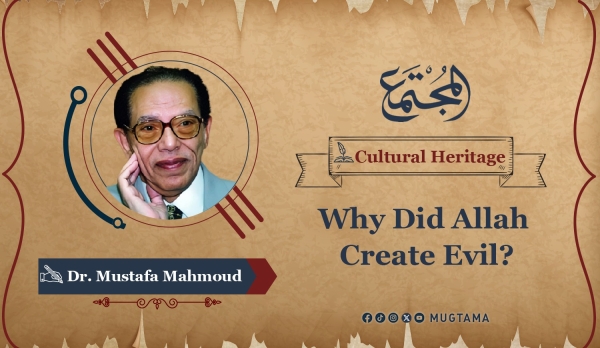My friend said mockingly:
"How can you claim that your God is perfect, merciful, compassionate, generous, and kind, while He has created all these evils in the world? Disease, old age, death, earthquakes, volcanoes, microbes, poison, scorching heat, freezing cold, and the agonizing pain of cancer, which does not spare even a newborn child or an elderly person. If Allah is love, beauty, and goodness, then how did He create hatred, ugliness, and evil?"
The issue my friend raised is one of the fundamental problems in philosophy, and schools of thought have been divided over it, with differing opinions. However, we say that Allah is entirely merciful and good, and that He does not command evil; rather, He permits it for a wisdom.
"Indeed, Allah does not order immorality. Do you say about Allah that which you do not know? Say, [O Muhammad], ‘My Lord has ordered justice and that you maintain yourselves [in worship of Him] at every place [or time] of prostration…’" (Al-A‘raf: 28, 29)
Allah only commands justice, love, kindness, forgiveness, and goodness, and He is only pleased with what is pure.
So why did He allow the oppressor to oppress, the murderer to kill, and the thief to steal?
Because Allah wanted us to be free. And freedom necessitates the possibility of error—there is no meaning to freedom without the right to experience, to err, to choose between obedience and disobedience. Allah could have made us all righteous by force, compelling us to obedience. However, that would have deprived us of free will.
In Allah’s divine order, freedom with suffering is more honorable for humans than slavery with happiness. That is why He allowed us to err, suffer, and learn. This is the wisdom behind permitting evil.
Moreover, an impartial and fair look at the world reveals that goodness is the rule and evil is the exception. Health is the norm, while illness is an exception—we spend most of our lives healthy, with only a few days of sickness. Similarly, earthquakes last only a few minutes within the millions of years of Earth’s existence. The same applies to volcanoes and wars, which are brief eruptions in the long stretches of peace that nations experience.
Furthermore, every event has a beneficial aspect. Sickness strengthens immunity, pain builds resilience and endurance, and earthquakes release built-up pressure within the Earth’s crust, preventing catastrophic explosions and keeping mountains in place as stabilizing weights. Volcanoes bring forth valuable minerals and enrich the soil with fertile volcanic ash. Wars lead to the unification of nations, fostering alliances that eventually result in institutions like the League of Nations and the United Nations—a global platform for conflict resolution. Some of the greatest inventions emerged from wars: penicillin, nuclear energy, rockets, and jet planes—all born from the crucible of conflict.
From snake venom, we derive antidotes. From microbes, we create vaccines.
If our ancestors had not passed away, we would not have inherited their roles. Evil in the universe is like the shadow in a painting—up close, it might seem like a flaw, but when viewed from a distance, as part of the whole picture, one realizes that it is essential and serves a purpose in the overall composition.
Could we recognize health without illness? Health is a crown on our heads that we only notice when we fall sick. Likewise, we wouldn’t appreciate beauty without ugliness, or normalcy without exceptions.
This is why the philosopher Abu Hamid Al-Ghazali said: The imperfection of the universe is its very perfection, just as the curve of a bow is what makes it suitable for shooting arrows—if it were straight, it would be useless.
Hardships and suffering serve a function—they test people and reveal their true nature.
Were it not for hardships, all people would be noble… Generosity is a virtue, and courage is the essence of battle.
It is through trials that we discover ourselves and determine our ranks before Allah.
Besides, this world is just one chapter of a story with many chapters to come. Death is not the end of the tale but its beginning. It is unreasonable to judge an entire play based on a single act, or to dismiss a book because its first page is unappealing.
Such a judgment would be incomplete…
The full wisdom can only be revealed at the final stage.
And what alternative does the critic propose? Does he wish for a life without death, disease, aging, weakness, limitations, sorrow, or pain?
Does he seek absolute perfection?
But absolute perfection belongs to Allah alone.
And there is only One who is perfect—why should there be more than one? What could He lack that would require another?
This means that my friend will not be satisfied unless he himself becomes Allah, and that is nothing but arrogance and presumption.
Now, let us turn the mockery back on him and his likes—those who are never pleased with anything. These people want the world to be a paradise. But what have they done to deserve paradise? What has my friend contributed to humanity to make himself worthy of being the Almighty who commands, “Be,” and it is?
Even my grandmother is wiser than this highly educated professor from France when she simply says: Goodness comes from Allah, and evil comes from our own souls.
These few words are an honest summary of the entire issue.
Allah sends the wind and flows the river, but the greedy shipowner overloads his vessel beyond capacity, causing it to sink—and then blames Allah and fate. What fault does Allah bear? Allah sent the wind as a blessing and the river as a gift, but human greed turned this blessing into a disaster.
How true and beautiful these words are: Goodness comes from Allah, and evil comes from our own souls.
-------------------------------------------------------------
- Book: “Dialogue with My Atheist Friend”







